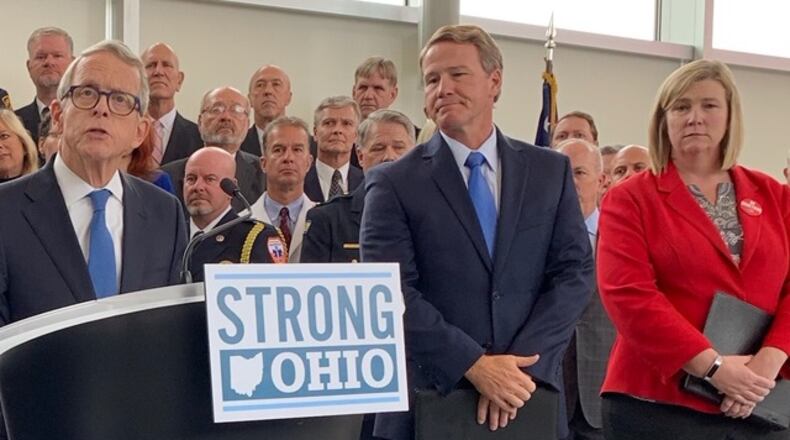Ohio Senate President Larry Obhof, R-Medina, said DeWine’s gun reform package in Senate Bill 221 isn’t likely to pass this year. “I’d say in general, my caucus is not comfortable with any limitations on the right to bear arms,” Obhof said.
The DeWine bill calls for multiple changes to gun laws, including:
- Stiffer penalties for firearms violations by violent felons.
- Increased penalties for straw purchases and providing firearms to minors.
- Creating a state-run voluntary background check system for private sales of firearms.
- Expand the use of 72 hour mental health holds to include people with drug and alcohol problems — holds during which they wouldn’t be able to access firearms.
More than half of the Republicans in the Ohio Senate oppose the voluntary background check provisions, Obhof said, and don’t want to see additional gun restrictions.
Even if the Senate voted on the bill, its viability in the Ohio House is questionable. Additionally, the House GOP caucus is in disarray with Speaker Larry Householder facing a federal racketeering charge.
The governor noted that his administration has taken action where it could. The state budget bill, signed into law before the Dayton shooting, provides $675 million for mental health and wellness services in K-12 schools, earmarks $9 million for grants to improve security at soft targets such as places of worship, and invests $15 million in Ohio Medicaid funds to expand access to tele-medicine mental health services.
On August 4 we will commemorate the one-year anniversary of the Oregon District shooting where 9 people lost their lives. Several events have been planned to remember and honor victims and survivors. For a complete list of events visit: https://t.co/kR2FcRxofk #DaytonShines pic.twitter.com/FbzJx7uExW
— Nan Whaley (@nanwhaley) July 24, 2020
The DeWine administration also is launching a pilot project in 10 counties, including Montgomery, to dramatically increase the number of warrants and protection orders that are automatically added to background check systems.
Ohio courts and law enforcement agencies are required to upload information to background check systems. DeWine said attention paid to failures to upload info has prompted a 900% increase in the number of warrants being entered into the federal National Crime Information Center system.
Andy Rowe, manager of Blind Bob’s in the Oregon District, gives DeWine credit for trying to get something done.
“He really struck me as a sincere person that cared about the issue,” said Rowe, who led the “Do Something” chant during the vigil. “That said, in the state of Ohio, it’s next to impossible to get anything done without the support of the legislature ... The state legislature has almost been criminally uninterested in doing anything about gun violence. Full stop.”
Rather the GOP-controlled legislature has shown a willingness this year to expand gun rights, rather than restrict them. Two bills — one addressing training requirements for arming school staff and another lessening penalties for failing to inform police during traffic stops if a weapon is in the vehicle — received legislative action in the past two months.
The Buckeye Firearms Association and National Rifle Association’s Institute for Legislative Action oppose SB 221.
“We’re obviously grateful (lawmakers) have not passed unnecessary gun restrictions on gun owners this year in the aftermath of the Dayton shooting,” Rob Sexton, lobbyist for Buckeye Firearms Association, said earlier this summer. “We’d ask that there be a greater examination of enforcing existing laws.”
NRA-ILA Ohio State Director David Weber sent a letter last December to Obhof explaining the group’s opposition to the bill.
“Although this measure was crafted as a response to violent and unspeakable tragedy, we are once again reminded that good intentions are no guarantee of good policy,” Weber says in the letter. “In it’s current form, SB 221 undermines the Second Amendment rights of Ohio’s law-abiding citizens while doing nothing to keep our communities safer.”
DeWine’s Strong Ohio gun bill hasn’t had a legislative hearing since Dec. 3.
“We have done everything we can do without the legislature. We are going to make another strong run at the legislature when they come back in session in the fall,” DeWine said. “We’re going to continue to do things we can do administratively, but for some of this we simply have to change the law.”
Staff writer Kaylee Harter contributed to this report.
About the Author

